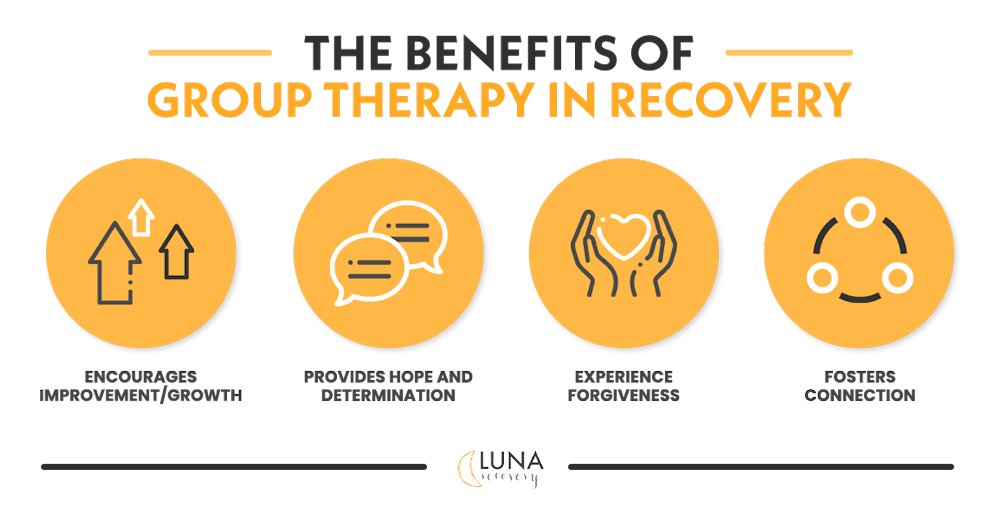Group Therapy for Substance Abuse
From the time that it was first used to help people get through the darkest and most difficult phases of life, therapy has made massive strides in techniques and methods. Group therapy for substance abuse is one of the more popular counseling methods used today. It emphasizes recovery aided by support from peers or “people in the same boat”, as evidenced by the numerous group therapy sessions held in rehab facilities today.
What is Group Therapy?

Isolation, rejection, and uncertainty are sure to make any kind of attempt at recovery quite difficult. These feelings will hinder most attempts at getting any positive idea or thought to the one in rehabilitation.
This type of therapy could prove to be quite effective where most other methods failed. Group therapy is a type of psychotherapy where a therapist works with several people with similar concerns or conditions all at once.
The intent is that the members of the group share a common or similar issue, and each is assured that there would be no judgment, recrimination, or fault-finding since everyone is mostly in the same boat. This gives a sense of belonging and of community, removing the barriers of exclusion. Essentially, group therapy for substance abuse emphasizes recovery aided by the principle that people with similar conditions don’t have to go through it alone.
In some cases, group therapy follows individual therapy, particularly when the patient has been deemed fit and confident enough for socialization. Knowing that one is not alone in the struggle is a huge boost to the recovery effort, and also a way of preparing them for full integration with society once more.
As there are several ways that group therapy could help with treatment, several types have been established to help target and treat the specific needs of the participants. They include the following:
This type focuses on identifying distorted or erroneous ideas and thoughts relevant to substance abuse, recovery, and staying sober. Many people go through detox and rehab without really understanding that some of their notions about treatment could be wrong, and this could lead to disenchantment or even failure.
This type centers around the interpersonal relationships of the patient and how they view and react to social interactions. They could have been fine socially before they became dependent on substances, but it all changed after they got hooked. This type seeks to fix these notions.
This type relies on the principles of cognitive-behavioral therapy (CBT), where a person’s perception of things could dictate how they react to certain things. In the case of drug abuse rehabilitation, the patients learn that there are better coping mechanisms they could adapt when faced with the situations that led them to substance abuse.
Apart from being used to treat people with mental disorders and developmental disabilities, this type seeks to furnish the patient with learning something creative to steer them away from thoughts relating to drug abuse.
Interestingly, even people who have experienced mental damage or trauma from prolonged drug abuse still exhibit some form of artistic creativity, and this type of group therapy allows them to express it.
This type extends to not only people with substance abuse issues but also to others who experience behavioral problems as well, such as anger management. Support groups offer the patient a venue where they could open up and share with people who may have similar troubles and experiences. This is quite effective as people react to therapy better knowing they are not alone in what they are going through.
What are the Goals and Benefits of Group Therapy for Substance Abuse?

The goals of group therapy are ultimately the session drivers that lead to the benefits derived from it. In this aspect, they are the same, as the goals set are what the therapy participants are wanting to achieve. The main benefits of group therapy for substance abuse include:
Being able to hear from others who went through similar troubles and circumstances removes the notion that a person suffers alone. It is that though they are unique in their struggle that makes it even harder for the person.
This gives hope by encouraging them to continue with the rehab treatment and solidifying their determination to see it through to the end.
Going through difficulties alone is extremely troubling. This creates hopelessness and frustration, both of which could tip someone trying to recover right over into a relapse.
By offering a way to connect with others, a patient in recovery is given the benefit of human contact and prepares them for full social reintegration outside of the circle of the group therapy.
Many people undergoing therapy often discover skills and abilities they did not think they had or could do. In many cases, therapy offers an unhindered opportunity for self-improvement that they would not find on their own.
For some, this self-discovery becomes the focal point where they are inspired to be truly free of substance dependence, or even of dependence on anything other than themselves.
A truly lamentable fact about some recovering substance abusers is that they are truly alone. Either they have lost whatever family they had because of their bad habit, or they lost the people they love and it drove them to develop the bad habit.
Whichever the case, the need to feel forgiveness could be filled through the group therapy sessions. They learn to purge their emotions of the guilt and pain they feel, and they get to hear others say that everything will be ok.
What Could be Expected in Group Therapy?
Many participants in group therapy often go into the sessions with no clear expectation in mind. They might have an agenda for the day and a vague notion of what they should say, but it still does not settle their mind as to how it might all turn out.
The best way to go about it is to remember what the personal goal was in joining the therapy, and move from there because it could be quite easy to lose focus with all the thoughts and emotions being experienced through rehab and recovery.
Admission and acceptance are key factors in addiction group therapy. People with substance abuse issues often lie to support their habit, until lying became almost second nature, even when there was no need to.
Everyone participating in the therapy is expected to be honest about what they feel, and what they are going through, to better arrive at the needed understanding and realizations relevant to recovery.
If anything else, recrimination and judgment have no place in therapy. There was a mistake at one point, and it led to the addiction. That part is done, all that needs to be sorted in sessions is how one feels about it and how they are dealing with it.
Sharing is essential because it is a way to get the troubles off one’s chest, and once it is out, acceptance could begin alongside the healing.
Forgiveness and acceptance don’t always happen overnight. For some, it doesn’t even happen for years. This is because addiction is a deeply moving and disturbing thing to go through, destroying large portions of a person’s life, including relationships that they need.
Acceptance often triggers a breakdown, where all the emotions come flooding out. This, however, is a good thing, as keeping it all bottled up is not just debilitating, but also dangerous. Once these things are purged, the breakthrough could commence and lead to a true and lasting recovery.
Although not everyone in the group is expected to bond with each other, there is a need for mutual respect and acceptance. This is developed over time as everyone listens and relates with each other in the group.
Some members of the group often find a commonality or a point of relation where they resonate well with others. This is often where friendships start, as each member learns to support the other in different ways.
Is Group Therapy Right for Me?

While most people will say that they don’t need affirmation or validation from others, seeking acceptance and being people of similar interests or circumstances is a very human thing.
This is the same for people looking to get into group therapy for addiction. The success rate of people who managed to ease into a sober life and maintain it is attributed to group therapy. Here are some things to know if you are considering group therapy for yourself or a loved one:
Are You Seeking Understanding and Acceptance for your Condition?
Participants in group therapy necessarily need to have at least one commonality between them. In the case of substance abuse, it is the fact that they all want to get clean and stay clean, and might be having a difficult time getting there. Sharing personal accounts of difficulties could serve a few purposes in group therapy:
- Affirm the fact that you are not alone in your plight
- Relate with the difficulty faced by others which could mirror your own
- Find the courage to continue, as everyone else is
Many seeking therapy are in a vulnerable state in one way or another. They could be struggling to stay clean even as circumstances push them back to bad habits. They could be questioning if they made the right decision to get off substances as they did.
These concerns are not things they will readily share with anyone else, even with family or loved ones. They will only share these with people who truly know what it’s like, and these are the participants in their support group.
It’s important to know, that speaking to a group will not be an instant fix, but it is the best start. Seeking any kind of therapy is always the best course in these troublesome situations, and group therapy could be the best option.
Learn More About LUNA Recovery’s Group Therapy for Substance Abuse
Recovery is never an easy task. More often than not, professional help is needed. That is where we come in. LUNA Recovery Services and the extensive experience of our staff and resources provided have proven to be successful in helping people on the road to recovery.
We know it’s not easy, but the best part of it all is that we are with you every step of the way. Contact us today at LUNA Recovery.
Dr. Allaire received his Bachelors of Science in Biology from the University of Houston, as Valedictorian of the College of Natural Sciences and Mathematics, and his Medical Doctorate from Baylor College of Medicine, where he served as Chief Resident. He is the medical monitor for the Physician Counseling Committee of the Harris County Medical Society and the Medical Director of Serenity House Detox. Dr. Allaire specializes in medically assisted detox cases, treating patients in recovery from addiction or other mental health disorders, the medical assessment and monitoring of patients with addictive disorders, medical care related to eating disorders and the medical treatment of patients with mental health conditions.



